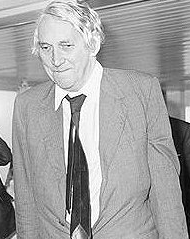Difference between revisions of "Nicholas Henderson"
(unstub) |
m (Text replacement - "who served as" to "who was") |
||
| Line 29: | Line 29: | ||
|end=1972 | |end=1972 | ||
}} | }} | ||
| − | }}'''Sir John Nicholas 'Nico' Henderson''' was a British diplomat and writer, who | + | }}'''Sir John Nicholas 'Nico' Henderson''' was a British diplomat and writer, who was British Ambassador to the United States from 1979 to 1982.<ref>The Times obituary (printed version)". The Times. 17 March 2009.</ref> He attended the [[Bilderberg/1994|1994 Bilderberg meeting]]. |
==Life and career== | ==Life and career== | ||
Latest revision as of 20:07, 20 February 2023
(diplomat) | |
|---|---|
 | |
| Born | 1 April 1919 |
| Died | 16 March 2009 (Age 89) |
| Nationality | British |
| Alma mater | Stowe School, Oxford University/Hertford College |
| Parents | Hubert Henderson |
Sir John Nicholas 'Nico' Henderson was a British diplomat and writer, who was British Ambassador to the United States from 1979 to 1982.[1] He attended the 1994 Bilderberg meeting.
Contents
Life and career
Henderson was born in London, the only son and second of three children of Sir Hubert Henderson, a prominent political economist and later Drummond Professor of Political Economy at Oxford. and of Faith Marion Jane Henderson, née Bagenal.
He was educated at Stowe School and Hertford College, Oxford, and was the President of the Oxford Union. Childhood tuberculosis disqualified him from military service during World War II. Instead, in 1942, he joined the Cairo staff of Lord Moyne, Minister Resident in the Middle East, on a temporary basis. In 1944, he was appointed Assistant Private Secretary to the Foreign Secretary, Sir Anthony Eden, and then to Ernest Bevin.
He joined the British Diplomatic Service in 1946 and rose to become Private Secretary to the Foreign Secretary in 1963. Subsequently he served as British Ambassador to Poland, Germany and finally France, from which post he retired in 1979 on his sixtieth birthday.
Valedictory dispatch and Ambassadorship to the United States
Upon retiring (as he thought) from the foreign service when relinquishing his post in Paris, he wrote a final dispatch titled "Britain's decline; its causes and consequences". The Economist obtained a copy and printed it in the same year stating "The despatch does not, needless to say, reach us from him and was presumably written for very limited circulation. But it is so unusually forthright and timely, particularly in its middle and concluding passages on British policy in Europe, under governments of every stripe, as to merit publication virtually in full."[2][3]
A surprise extension to Henderson's career came about because of the election of Margaret Thatcher as Prime Minister in May of that year. Mrs Thatcher invited him to return to service as Ambassador to Washington, where he served until 1982. Mrs Thatcher had first asked Edward Heath to take up the post, but he had refused the offer. Henderson was enormously popular in Washington, and he and his wife Mary formed a close personal friendship with President Ronald Reagan at a crucial time in the latter's presidency, oiling the special friendship which developed between Reagan and Margaret Thatcher. In particular he was successful in putting the British side of the Falklands War in 1982, and maintaining friendly relations between the nations when that friendship was under some strain.
In retirement, Henderson wrote several books on history, and an account of his career as a diplomat, Mandarin. He held directorships of several major British companies, including the Channel Tunnel Group, Sotheby's, and Hambros. He also had close ties with the Prince of Wales, serving as Lord Warden of the Stannaries and Chairman of the Prince's Council (the body which oversees the Duchy of Cornwall) after retiring from the Diplomatic Service. He was appointed KCVO for this service to the Crown. He gave the Romanes Lecture in Oxford in 1986.
In 1951, Henderson married Mary Barber (née Cawadias), a Greek-born former war correspondent for Time-Life.[4][5] She died in 2004. Their only child, Alexandra Nicolette, married the photographer Derry Moore, now the 12th Earl of Drogheda. As Alexandra Henderson, she has followed a career as a television and radio producer specialising in current affairs.
He was generally known as "Nicko (sp. "Nico" in Lady Thatcher's memoirs) Henderson" in private life.
Event Participated in
| Event | Start | End | Location(s) | Description |
|---|---|---|---|---|
| Bilderberg/1994 | 2 June 1994 | 5 June 1994 | Finland Helsinki | The 42nd Bilderberg, in Helsinki. |
References
- ↑ The Times obituary (printed version)". The Times. 17 March 2009.
- ↑ "Britain's decline; its causes and consequences" The Economist 2 June 1979
- ↑ Parris, Matthew; Bryson, Andrew (2010). Parting Shots. London: Viking. ISBN 978-0-670-91929-1
- ↑ HENDERSON, Sir (John) Nicholas, Who Was Who, A & C Black, 1920–2008; online edn, Oxford University Press, Dec 2009. Retrieved 6 March 2012
- ↑ Xenia, the Greek spirit personified, The Telegraph, London, 17 February 2004
Wikipedia is not affiliated with Wikispooks. Original page source here